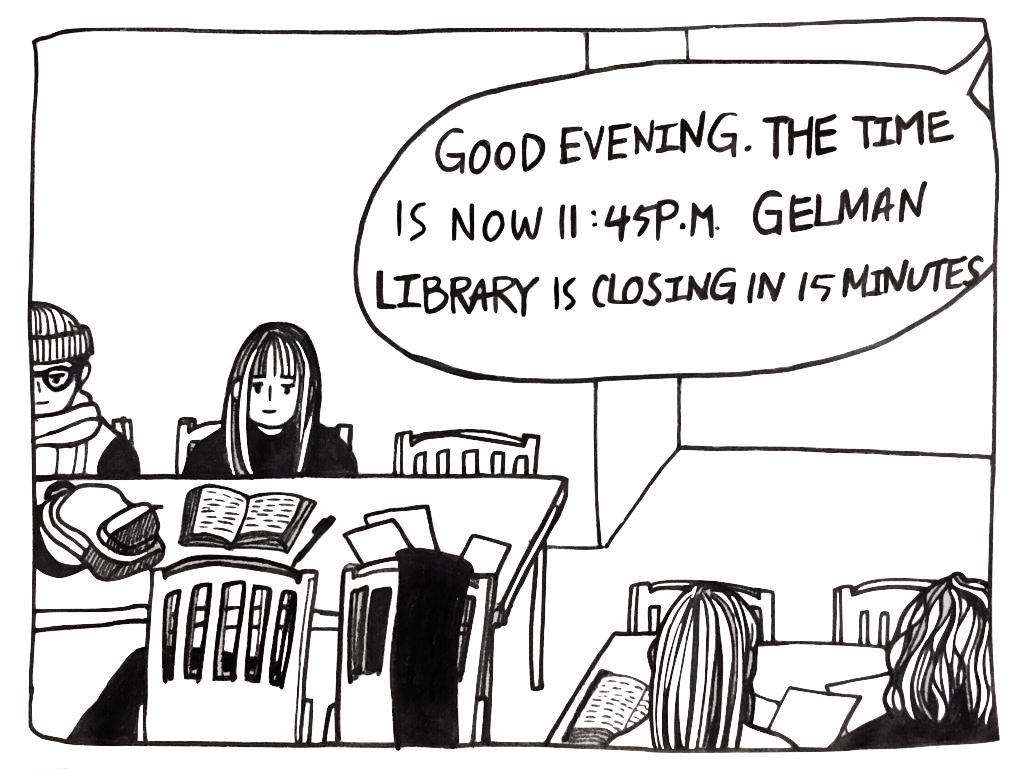Pulling an all-nighter to finish a paper or cram for a final exam is all too common on college campuses. In fact, many students boast about their ability to go days fueled by Red Bull, coffee and even Adderall to avoid sleeping during final exam season.
By running 24-hour facilities, like Gelman Library, for students, GW is inadvertently endorsing unhealthy study behavior. Even if buildings have a set closing time, like the study space in the District House basement, students are able to stay in the building studying all night, which further contributes to the problem on campus. Study spaces that are open all night support unhealthy lifestyle choices and the administration should close academic buildings earlier to prioritize students’ mental health.

Cartoon by MARGARET GROBOWSKI
Gelman Library and other study spaces need to have set hours that they are closed to encourage a healthier lifestyle for students. Many universities across the country, including some of GW’s peer schools and other top institutions, have adopted this practice.
Most academic buildings and libraries at the University of Pennsylvania close by 2 a.m. or earlier. Princeton University takes it even a step further, closing most academic buildings by midnight.
Some of GW’s peer institutions like New York, Georgetown and Northeastern universities also have libraries that are open 24/7 for students, but other peer schools haven taken an important step to support students by not offering constant access to study spaces. Most of the libraries and academic buildings at the University of Southern California close by midnight and the main library at Syracuse University closes at midnight.
Swapping 24/7 study spaces to close at midnight or 2 a.m. will support students’ mental health and encourage healthy study habits. Many students take classes starting as early as 8 a.m. and need adequate time to sleep to perform well in class. While an all-nighter may seem like a great idea in the short term, it often facilitates lower concentration and awareness which can negatively affect students’ grades and ability to learn. On average, college students who sleep eight or more hours per night have a higher GPA than those who only get six hours of sleep per night, according to a study conducted by researchers at the University of Georgia. Changing hours of buildings won’t force students to get the rest they need, but it prevents students from feeling pressure to study later.
Critics of closing libraries early may argue that by limiting public study spaces, students will simply continue to study in residence halls, disturbing other students who want to sleep. However, this is far from the truth. Countless studies have illustrated that college students’ strongest influence is their peers so therefore, if libraries are closed, students in residence halls will be more likely to copy peers who are receiving adequate sleep and engage in healthy lifestyle and sleeping habits themselves.
In addition to supporting students, closing study spaces early benefits the University by saving it money. By closing buildings early the University would save on electricity and other services that are needed to keep buildings running, but they will also save money on paying security and other employees that must stay in buildings while they are open. If employees – who can also be students – no longer have to work overnight shifts because buildings are closed, they will also see the health benefits of a normalized sleep schedule.
Even if students choose not to study in the library, having it open 24/7 creates the notion that students should be constantly studying whether in a residence hall or elsewhere. By closing Gelman Library and other buildings that house study spaces for students at an earlier hour, it alleviates pressure on students to cram and binge-study the night before exams, which are methods that have failed to be proven effective anyway.
By closing libraries and academic buildings at 2 a.m. like many of the other universities across the country, GW would communicate to students that their health is more important than studying, and the altered hours support students creating healthy study habits. Not only is closing all academic buildings and libraries earlier the most cost-efficient method for GW, it is also the most beneficial to students. GW needs to shift the way it perceives 24/7 study spaces to prioritize students’ well-being and mental health.
Colette Bruder, a sophomore majoring in international affairs, is a Hatchet opinions writer.
Want to respond to this piece? Submit a letter to the editor.

